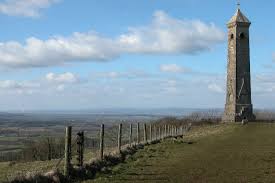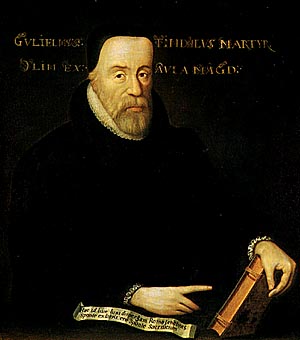Written by: Jenny Sánchez

You wouldn’t often think of putting Bible translator and Martyr in the same sentence but at the time preceding and during the reformation, the attack against placing the Word of God into the hands of all people by the Roman Catholic Church was ruthless and unsparing. But God…
William Tyndale The Translator
On a hill overlooking the village of North Nibley in Gloucestershire, England, stands a tall monument that is visible for miles across the Severn valley. On the front of the tower there is a plaque that reads,
ERECTED A.D. 1866
IN GRATEFUL REMEMBRANCE OF
WILLIAM TYNDALE
TRANSLATOR OF THE ENGLISH BIBLE
WHO FIRST CAUSED THE NEW TESTAMENT
TO BE WRITTEN IN THE MOTHER TONGUE
OF HIS COUNTRYMAN
BORN NEAR THIS SPOT HE SUFFERED
MARTYRDOM AT VILVORDEN IN
FLANDERS ON OCTOBER 6 1536
“William Tyndale gave us our English Bible,” this is how author David Daniell begins his biography on the life of William Tyndale.
Tyndale was born in 1494, most likely between Bristol and Gloucester on the western side of the Cotswold hills. Trade and agriculture were prosperous and there were main trade routes from all parts of the north carrying goods through that particular strip of land.
 God placed Tyndale right in the center of world languages where, from an early age, he was exposed to different peoples and cultures. It’s helpful to know that the English language at that time was crude and unrefined, struggling to find a form that was neither Latin nor French. The Bible text that the people heard was always from the Latin and few could understand it. Books were translated into Latin. At the beginning of the 16th century, the famous Bodleian Library at the University of Oxford, where Tyndale would begin studying at the age of 12, contained 6,000 books, and only 60 were in English. The language lacked precision, and William Tyndale changed all of that. He shaped the language at it’s transition point, between middle English and early modern English, and in giving us the English Bible he became the father of Modern English. Tyndale understood the impact of what words, when placed together in a certain order, could say to a reader.
God placed Tyndale right in the center of world languages where, from an early age, he was exposed to different peoples and cultures. It’s helpful to know that the English language at that time was crude and unrefined, struggling to find a form that was neither Latin nor French. The Bible text that the people heard was always from the Latin and few could understand it. Books were translated into Latin. At the beginning of the 16th century, the famous Bodleian Library at the University of Oxford, where Tyndale would begin studying at the age of 12, contained 6,000 books, and only 60 were in English. The language lacked precision, and William Tyndale changed all of that. He shaped the language at it’s transition point, between middle English and early modern English, and in giving us the English Bible he became the father of Modern English. Tyndale understood the impact of what words, when placed together in a certain order, could say to a reader.
His gift from God was a love for God, a love for God’s Word, and a deep understanding of how to translate the Greek and Hebrew into the common language of English speaking people. Daniell, in his biography of William Tyndale states, “…for Tyndale, an English translation of the Bible had to be as accurate to the original languages, Greek and Hebrew, as scholarship could make it; and it had to make sense. There are times when the original Greek, and even more the Hebrew, are baffling. A weak translator goes for paraphrase and hang the sense (not considering whether it makes sense or not).” But, because Tyndale understood the language, he knew what made sense and was able to create unforgettable words, phrases, paragraphs and chapters.
An example of his skill taken from Romans 5, would translate from the Latin,
“But God commmendeth his charity in us; for if when were yet sinners, after the time Christ was dead for us…”
However, in Tyndale’s Greek, it became,
“But God setteth out his love that he hath to us, seeing that while we were yet sinners, Christ died for us…”
The blurry of the Latin becomes focused in Tyndale’s Greek. He knew what words, placed together in a certain order could say to a reader. He wrote in short Saxon sentences, a manner similar to those found in Proverbs. “The birds of the air, the fish of the sea.” This is Tyndale’s construct.
(You may not be as excited as I am right about now but I do hope by the end of this you will be. For my part, I’m so thrilled I can hardly stand it.)
We don’t often stop to think of how beautiful the language of the Bible is and how Tyndale made this possible. For instance consider these words found in Genesis, “And they heard the voice of the Lord God as he walked in the garden in the cool of the day. And Adam hid himself and his wife from the face of the Lord God. and the Lord God called Adam and said unto him, Where art thou?” Thank God for William Tyndale.
Tyndale’s impact on the world is simply astounding. It is said that part of his genius as a translator was his gift for “knowing how ordinary people used language and he translated at that level.”
We are the beneficiaries of William Tyndale’s gifts.
Eighty-four percent of our King James New Testament is a word for word copy of Tyndale’s translation. Of the Old Testament books translated, seventy-six percent of the King James is Tyndale’s work. Tyndale translated the original texts, for the very first time, from the original Greek and Hebrew into English, and then printed them into pocket sized books and smuggled them into England for everyone to own. He said, “If God spare my life, ere many years I will cause a boy that driveth the plough shall know more of the Scripture than thou dost.” God did spare his life, until the time He saw fit to bring Tyndale into His presence through martyrdom.

Because it was illegal to translate the Bible into English “by any man on his own authority, under pain of punishment as a heretic.” Tyndale was hunted down, betrayed and arrested around 21 May 1535 and placed in Vilvorde Castle, six miles north of Brussels. His crime? Heresy! He did not agree with the Holy Roman Emperor. Essentially Tyndale’s crime was translating the Bible into the language of the common people.
It is said that during his imprisonment, “Such was the power of his doctrine, and the sincerity of his life, that during the time of his imprisonment, (which endured a year and a half), he converted his keeper, the keeper’s daughter, and others of his household.”
Here is the short account of William Tyndale’s death.
“On or near 6 October 1536 William Tyndale, after much reasoning, when no reason would serve, although he deserved no death, he was condemned by virtue of the emperor’s decree…and, upon the same, brought forth to the place of execution, was there tied to the stake, and then strangled first by the hangman, and afterwards with fire consumed, in the morning at the town of Vilvorde, crying thus at the stake with a fervent zeal, and a loud voice, ‘Lord! open the king of England’s eyes.’”
There is so much more I could say about this remarkable man, but I hope this very scaled down version of his life whets your appetite to discover more of him for yourself.
I will end with the beginning of Tyndale’s prologue to his revised New Testament, the glory of his life’s work, printed in 1534.
“Here thou hast (most dear reader) the new testament or covenant made with us of God in Christ’s blood.”

1 thought on “The Blood of the Martyrs – Part II”